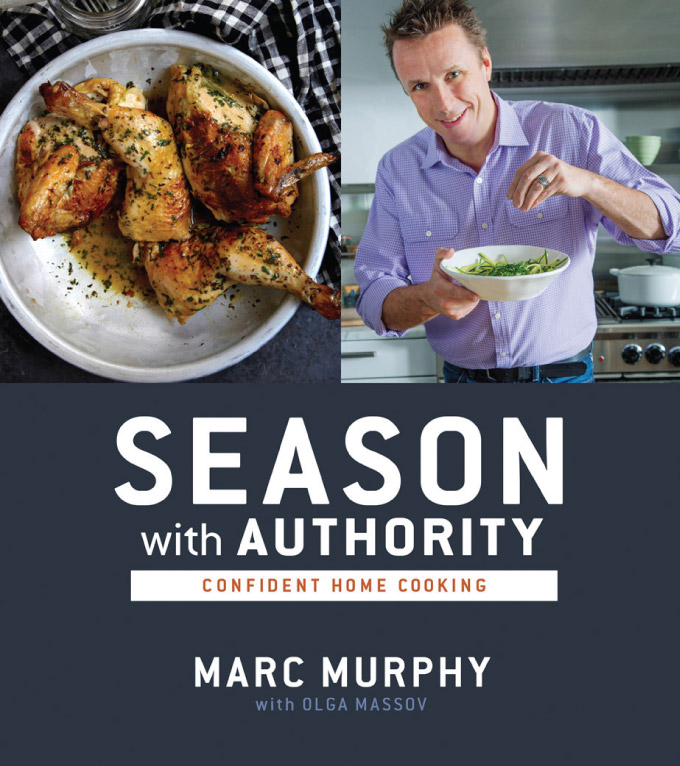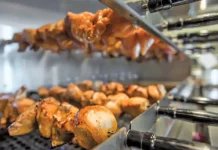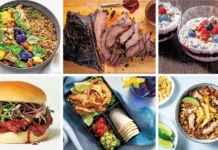Part worldly epicure, part laid-back surfer, Marc Murphy fell in love with French and Italian cuisine during a childhood spent living throughout Europe. He went on to work in some of the most highly esteemed kitchens in the world from Paris to Monte Carlo and today is one of New York’s most celebrated chefs.
Total Food sat down with Marc Murphy to talk about his background and upcoming projects.
So how did you end up at the Institute of Culinary Education? What impact did that have on your career?
I didn’t do well in school, I’m very dyslexic. My high school counselor looked at my grades and said: “Well, son, we think you should just go get a job. We don’t think any colleges are going to take you.” I thought, well, if I learn how to cook, I’ll be able to eat. The one thing I didn’t want to be was hungry! So I decided to go to a cooking school and I ended up getting addicted to it. And then you just had to go out in the restaurant — and get yelled at by chefs every day, to truly learn how to do it right.
How did your career as a chef evolve?
One of my old cooking school teachers set me up at Prefix. I worked there about a year and a half and learned every station. At that point David Casternacht told me, you’re done here, buddy. It’s time for you to move on. You’ve learned everything here. Now you’ve got to go learn everything in another kitchen.
So I moved back to Paris, where I bought a Michelin Guide and started walking door to door to each of the top restaurants to see if any were hiring. One chef said, “No French kid would ever do this.” He says, “You could come and work for free.” Ha! So he sent me to a couple people for an interview and I ended up landing a job in a one-star restaurant. I was actually going to just stay there one year but the executive sous chef wanted to take a vacation so they begged me to stay, promising me a partnership with Andre Dugart. So I stayed and moved down to the South of France. Then the chef from Le Cirque heard that I was coming back to America and he hired me.
It was so weird. I had this French guy on the phone, saying, “Where are you, you’re supposed to be at work.” I’m like, “What are you talking about?” He tells me he’s the chef at Le Cirque and Dugart told him that I was supposed to be coming here to work.
What happened after that?
I ended up working for that guy off and on for almost three years. After that Joey Fortinado called me back up and said he was opening a Middle Eastern Mediterranean restaurant, in Tribeca and he needed a sous chef. I’m just a line cook. But I worked for him for about six months and met a consulting chef there who ended up becoming the back-of-the-house general manager for Windows on the World. And he calls me up and aks if I want to be chef of the Cellar in the Sky on top of the World Trade Center. I thanked him but told him I’m not a chef. I’ve only been in this job for six months and it’s my first sous chef’s job.
I’m having a great time down here. So I turned him down I think three or four times. Then, finally, he calls me and tells me to meet him downtown. We get in the elevator, up to the 107th floor, the Cellar in the Sky. He writes down on a piece of paper what he would pay me. it was literally like getting double what I was getting paid as a sous-chef. But I did it and it was my first chef’s job.

What did you do after that?
After I left there, I worked with Abraham Merchant on the Upper East Side. I helped him get South West New York going, which is down by Brookfield Place. Then we did a restaurant called Chenoisis together. And then I met my wife and we ended up putting our money together and we bought a little building in Tribeca to open Landmarc.
As you were going through all of this, did you ever think that you would want to own your own place?
The whole time I always thought, if I work for really good people and I learn really well, things will work out. I love what I do. I never really had a plan. My plan was just to have a job. But wow, I like what I do. And I’m enjoying it. And then, they pay me for it. That is a real fun thing.
You grew from a single unit into a multiple restaurant company. So, at some point you had to extricate yourself from the kitchen.
All of a sudden I’m running a business. And I wake up every morning and keep saying, what the hell? I surround myself with really good people. I’ve got a great CFO. I’ve got a great director of operations who keeps everything going. And I’ve obviously learned a lot over the years, both in making things happen, and screwing things up. I mean, that’s the only way. That’s the way chefs do it. We screw it up, and we go back and we do it right the next time.
You’ve done some TV, some celebrity show stuff. This kind of thing seems to have had an impact on the role of a chef, the ability to grow your business, your brand. What are your thoughts on that?
First of all, it’s great for my brand. I don’t dislike anything that brings the customers in! It’s fantastic. The Food Network’s “Chopped” is just bringing more awareness to food and the food industry and everybody is getting more educated. I do hope people are getting healthier when they start realizing what you can eat and how they can cook and not just buy stuff in boxes and open them up and eat them. Somebody sent me a video of a pilot. And they said, you want to do this thing called “Chopped?” I was like, sure, what the hell. And now we’ve just shot our 315th episode.
What do you think is most important about running a good restaurant?
The people. Hiring good people. For a restaurant with a 300-seat capacity, the one I have at Time Warner, I’ve had three general managers over the seven years it’s been open. And one of them is now my assistant director of operations.
Profit sharing? Pat on the back? Respect? What are the pieces that go into treating people properly?
I just treat people like human beings, giving them a job that they love to come to. If something’s going wrong, I always ask my management staff, did we give that person the right tools to be able to do the job? Maybe they don’t know how to do the job. And maybe it’s our fault that we didn’t train them the right way. When we hire people, let’s hire nice people and teach them how to work. Because people who know how to work are nice. I don’t know how to teach people to be nice. So you start by hiring people who already are.
You’ve seen a lot of changes in the city through the years. What’s your read on the role of the New York City restaurant today in a local economy relative to landlords, relative to the city? What’s the role? Where are we?
Right now we seem to be heading in the direction of a lot of Starbucks. Nobody comes to New York City for Starbucks. People come here because they want to go to Cat Food Deli, to Landmarc, to WD50. They want to go to places that are interesting. But the interesting places are going away. The Korean bodegas are all being replaced by the big chains. Anthony Bourdain recently did a piece on the Bronx on Parts Unknown. That’s what New York was like. All these little shops. Between the regulations, between the rent, it’s driving a lot of people out. The fabric of this city and the restaurant business is going to change. There’s no doubt about it.
Tell me about your work with the City Chapter of the New York State Restaurant Association.
We’re constantly involved with government agencies, trying to work with them, because there’s only one way to work with government. You’ve got to get in the sandbox, and play with them. If you want a change in the health department, you’ve got to do it. Yes, it takes months to get the conversation with the health department but you have to work up to these relationships. The NRA now has worked its way up to quarterly meetings with the health department. It’s taken years to get to this point.
Is life better or the same, going from Bloomberg to DeBlasio?
The biggest change right now is coming from the state level. I’m hoping people start understanding what’s going on, deciding to raise the salaries of many employees from $5 to $7.50. Every one of my employees has to be paid $10 an hour. So right now the way it is, we have a tip credit. I pay my staff $5 an hour.
But if they don’t make the $10, I have to make that up so they at least make minimum wage. Mind you, most waiters in our city make anywhere between $25 and $60 an hour, with tips. This whole minimum wage thing is more money out of my pocket. And that doesn’t allow me to give anything to my back-of-the house-guys. I would love to be able to give that money to my back-of-the-house staff. They’re always getting the short end of the stick.
And then my managers are looking at me and going, wait a minute; the waiters are getting a raise? Where’s mine? How am I ever going to make it up to everyone? It’s not like there’s more money at the table. I already had to raise my prices a dollar or two to cover Obamacare. At a certain point, there’s a breaking point. Eventually we’re going to become like France and Italy. We’re going to just pay our waiters 25 bucks an hour. And there won’t be a line for tips anymore. We’re a tipping culture. It demotivates the wait staff. There’s no other way to say it.
What about the catering business?
When I have a catering event at Benchmarc, we hire three sales people and all of it comes out of Time Warner because we have a big enough kitchen for that. And that was a learning experience, too. At the beginning, I started off with Landmarc Catering. And we didn’t go anywhere with it. Because everybody just thought we could only get Landmarc. But we can actually make anything, basically.
So then we changed it to Benchmarc Events and so my Benchmarc Events’ sales team primarily concentrates on selling all of my restaurants. The banquet spaces at Kingside, at Landmarc, Time Warner and Ditch Plains and Landmarc downtown. It’s great because we can offer other places. For example, as we did for the past two years in a row, all the catering for the Christmas Spectacular at Radio City Music Hall. We did 45 parties in 22 days. We bring in extra staff to help out with things like that. We’ll do whatever you need.
What does the future hold?
I just want to continue down the road I’m going. I get up every morning. And I love what I do. I think that I’m probably the luckiest person in the world. I truly enjoy what I do. And I truly enjoy taking care of people. Not only the customers, but also my 500-plus employees. It’s a great life.
























Comments are closed.